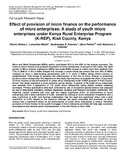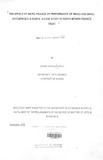Effect of provision of micro-finance on the performance of micro-enterprises: A study of youth micro-enterprises under Kenya Rural Enterprise Program (K-REP), Kisii County, Kenya.

View/
Date
2011Author
Otieno, Simeyo
Lumumba, Martin
Nyabwanga, R. Nyamao
Ojera, Patrick
Odondo, Alphonce J.
Language
enMetadata
Show full item recordAbstract
Micro and Small Enterprises (MSEs) sector contributes 20% to the GDP of the Kenyan economy. The
vision of micro finance is to promote the growth of micro enterprises. In pursuit of this vision, the rapid
growth of Micro finance institutions (MFIs) has made MSEs access to credit more than doubled from
7.5% in 2006 to 17.9% in 2009. Despite this increase, a recent study has shown that over 50% of MSEs
continue to have a deteriorating performance with 3 in every 5 MSEs failing within months of
establishment. This brings to question the effectiveness of the role of micro finance in promoting
growth of micro enterprises. The objective of this study was therefore to evaluate the effect of provision
of micro finance on the performance of youth micro enterprises under K-REP program in Kisii County,
Kenya. The study employed a cross sectional survey design. A sample of 86 youth micro enterprises
was selected from a population of 110 youth micro enterprises using simple random sampling
technique. Primary quantitative data were collected by use of structured questionnaires and analysed
by use of descriptive statistics, multiple regression analysis and Pearson correlation coefficient. The
empirical results revealed that loan had the largest significant effect on performance of micro
enterprises with a beta coefficient of 0.385, followed by training in micro enterprise investment with a
beta coefficient of 0.281 and Savings mobilization had the least but significant effect with a beta
coefficient of 0.272. Based on the research findings, the study concludes that provision of micro
finance has a significant effect on the performance of youth micro enterprises in Kenya. Therefore
provision of micro finance to the youth to engage in micro enterprise activities will help spur economic
development and alleviate youth unemployment, in line with Kenya’s vision 2030.
Citation
Simeyo, O., Martin, L., Nyamao, N. R., Patrick, O., & Odondo, A. J. (2011). Effect of provision of micro-finance on the performance of micro-enterprises: A study of youth micro-enterprises under Kenya Rural Enterprise Program (K-REP), Kisii County, Kenya. African Journal of Business Management, 5(20), 8290.Publisher
University of Nairobi
Collections
Related items
Showing items related by title, author, creator and subject.
-
Credit rationing by micro finance institutions And its influence on the operations of Small and micro enterprises.
Rukwaro, Margaret W (University of NairobiSchool of Business, College of Humanities and Social Sciences, 2001)This study establishes how MFIs ration credit among MSEs. The hypothesis of the study was that credit rationing influences the operations of MSEs. Savings, business profitability, group membership, location of the ... -
The effect of micro-finance on performance of micro and small enterprises in Kenya: A case study of Kenya Women Finance Trust
Njenga, Moses G (University of NairobiDepartment of Economics, 2002-09)The MSE sector, which has over the years demonstrated a remarkable capacity to grow even in the midst of generalized economic decline in the rest of the economy, remains as one of the few available options to the urban ... -
Factors affecting sustainability of micro-credit groups in Kenya: a case of Bimas Micro-Finance Institution in Machakos County
Nzomo, Justus M (University of Nairobi, Kenya, 2012)This research study focused on the factors affecting sustainability of micro-credit groups in Kalama Ward-Machakos County in Kenya. The research report sought to establish the importance for Microcredit groups to be self ...



